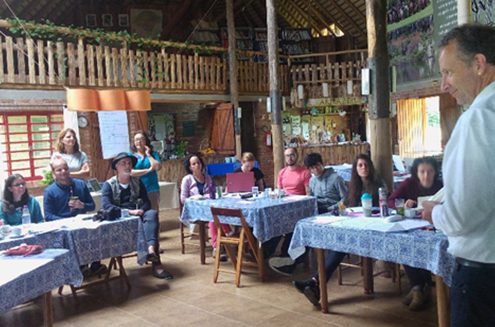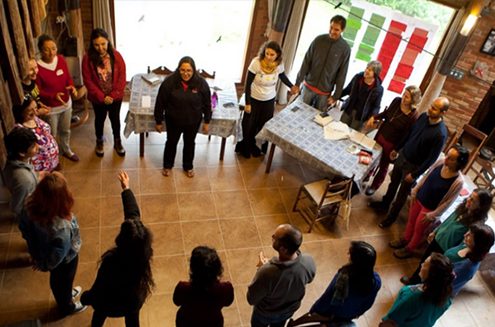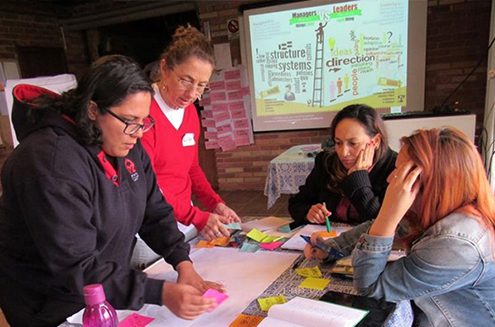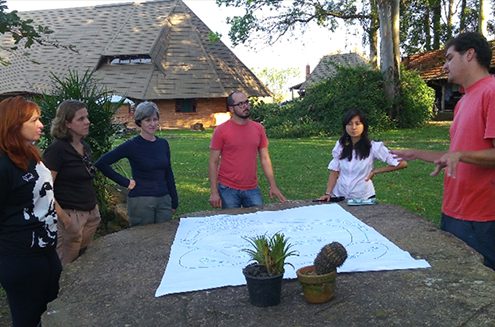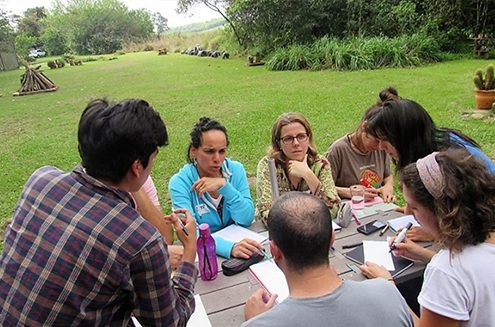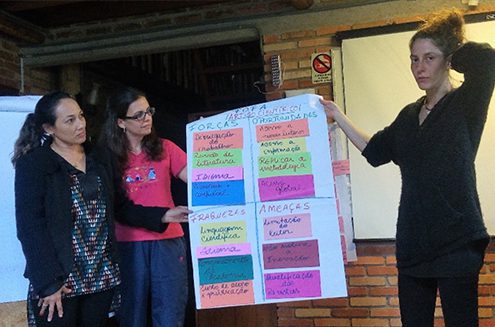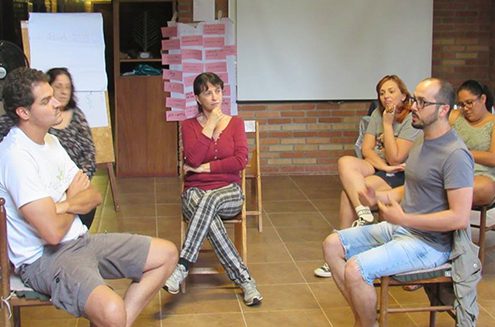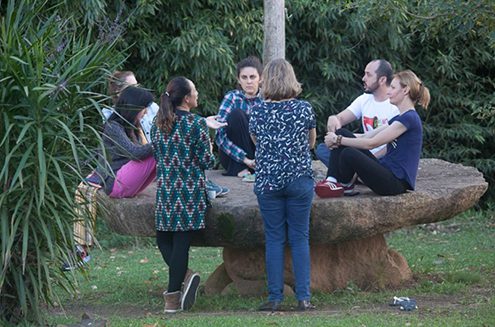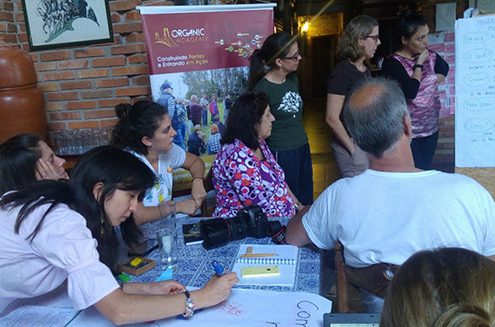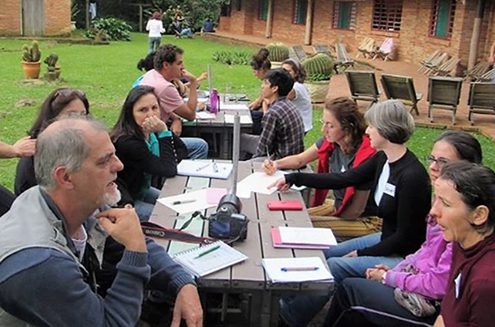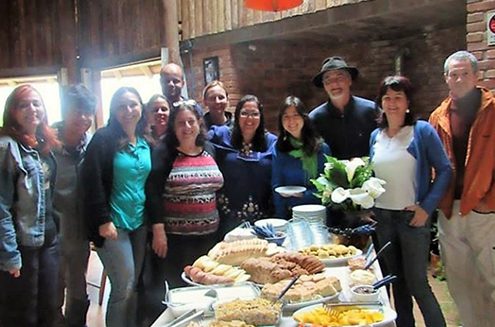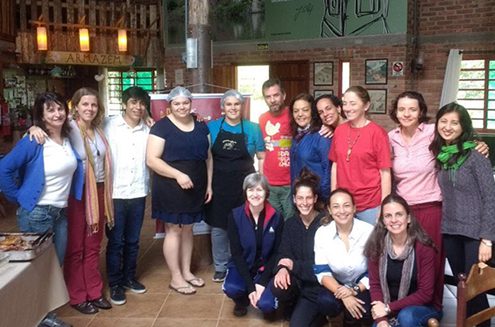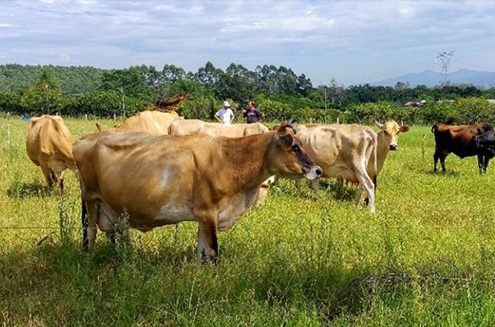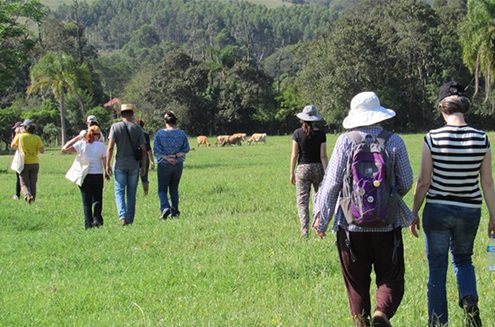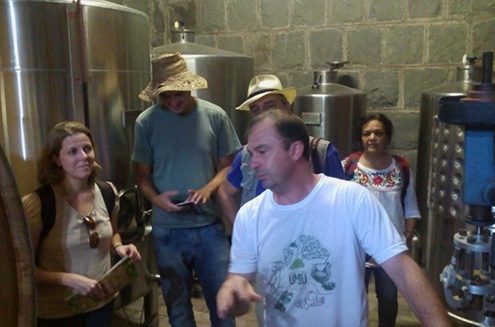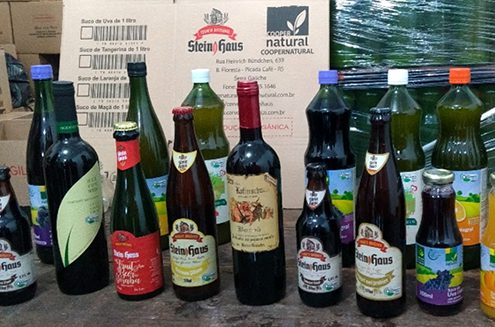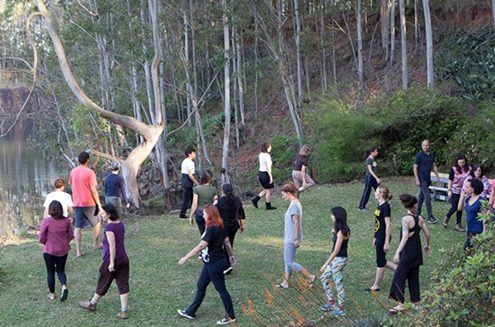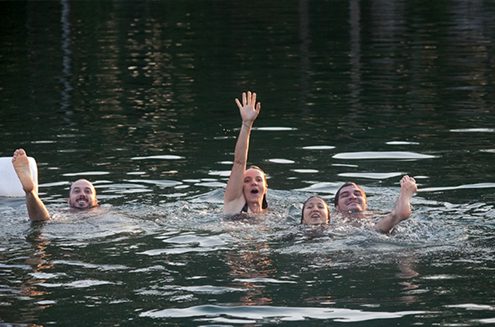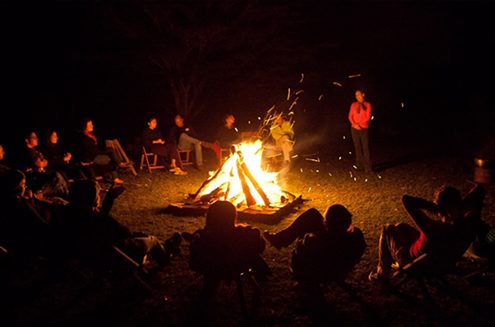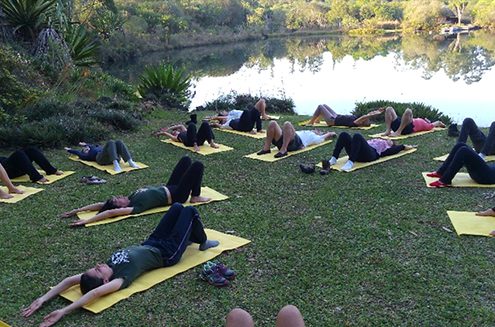For its first edition in Brazil, the course took place from September / 2017 to June / 2018, thanks to the partnership IFOAM-IBEM
IFOAM (International Federation of Organic Agriculture Movements), in partnership with IBEM (Institute of Well-being), offered for the first time in Brazil the Training Course of Leaders in Agroecology and Organic Production.The activity aims to develop leadership skills and facilitate the construction of networks for the exchange of knowledge, innovation and interaction between the different players of the agroecological movement and the organic segment. The course is held since 2012 in countries in Europe, Asia and Latin America, achieving success in all its editions. Angela Escosteguy, director of IBEM, explains that the course focuses on personal development for leadership and does not address technical production issues. For her, the organic movement in Brazil is in a new phase. The technical issues are mostly solved and now it is necessary to move forward in order to show society the advantages of this production model. “The traditional chemical model has very strong economic power and invests heavily in advertising its products, posing a challenge, that is, we must touch people’s hearts and minds and show that this proposal is healthier not only for producers, but also for consumers and for the entire planet. For that, we need to work in networks, connected, promoting the exchange of information and mutual strengthening, ” she said.
ABOUT THE COURSE
With a duration of 10 months, the course takes place in three phases: two face-to-face sessions of one week each and an 8-month distance phase with a webinar every month. During the course, participants would prepare a report about their region, do some public action, such as interview, lecture or article publication, and prepare a Draft Action to be developed later in its own context. The first face-to-face phase occurred in Rincão Gaia / RS, see details below. The last phase (face-to-face of 40 hours) will be in June 2018, in São Paulo. In addition to a visit to organic producers, the second phase will have an extra activity one day at Biofach Brasil – the largest organic fair in Latin America – where the certificate of completion of the course will be delivered.
ABOUT THE FIRST PERSONAL ENCOUNTER
The first phase of the course took place from September 18 to 24, in the Rincão Gaia – José Lutzenberger legacy, in Rio Pardo, RS.
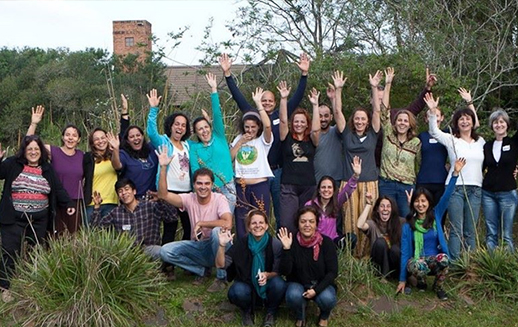
Markus Arbez (Executive Director of IFOAM / Germany), Barbara Zilly (IFOAM / Germany), Patrícia Flores (IFOAM / AL / Peru) and Angela Escosteguy (IBEM president / Brazil) formed the team of facilitators.
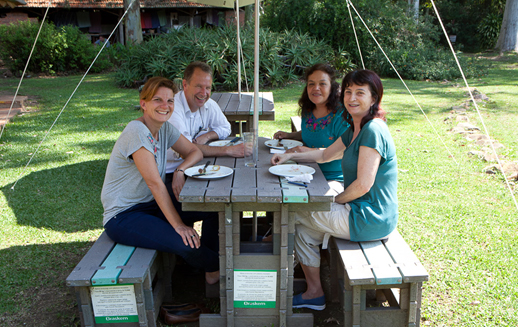
The week had multiple activities, such as theoretical classes and group dynamics.
Debates and practices of leadership and various forms of communication.
In addition to information and discussions about on the situation and directions of the organic agriculture and agroecology movements in several countries.
During the week 80% of the served food was organic, partly produced in Rincão and complemented by Cooperativa Pão da Terra. Below, farewell and thanks to the cooks and staff of the Rincão for the welcome.
The program included two technical visits: the first at the Lomba Grande farm, a producer of milk and organic dairy products, in Novo Hamburgo / RS.
And the other second at Coopernatural, a cooperative that produces juices, jellies, beer and organic wines, in Picada Café / RS. The group got to try organic beer.
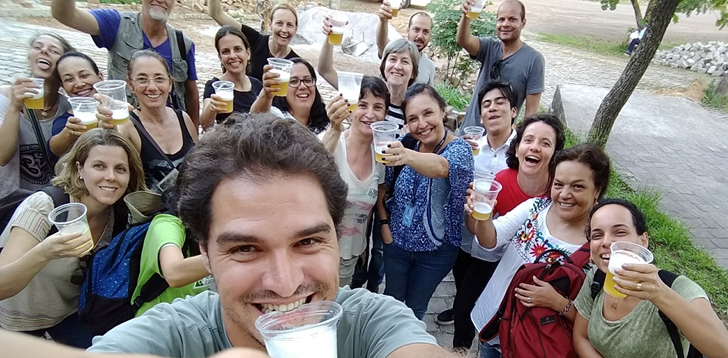
In the photo below, Lara Lutzenberg, director of Rincão Gaia, Dr. Magnólia da Silva, Professor of the Faculty of Agronomy of UFRGS, who was a partner of the event, provided transportation for the visits and Angela Escosteguy, director of IBEM.
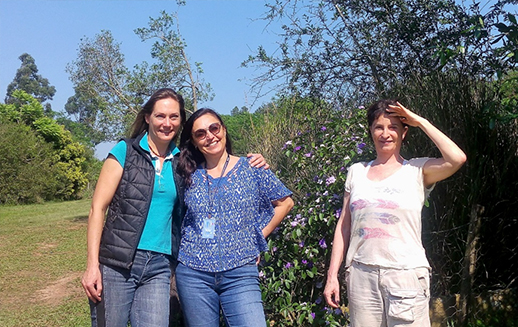
There were also various nature-based integrative activities such as yoga, walking, bathing in the lake and meditation.
CLOSURE OF THE COURSE WITH CEREMONY IN THE HUT
For Angela Escosteguy, “It was very special to participate in this first phase of OLC in Brazil. It was a beautiful week of learning, coexistence and harmony immersed in the wonderful energy of the Rincão Lutzenberg Legacy Gaia! My gratitude to all who contributed to make this possible. ”
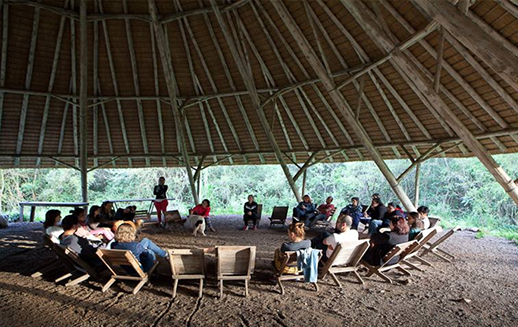
AVALIAÇÃO DO CURSO
(17/20 respostas anônimas)
Esta primeira fase presencial (F2F1) teve média de 8,5 sobre 10.

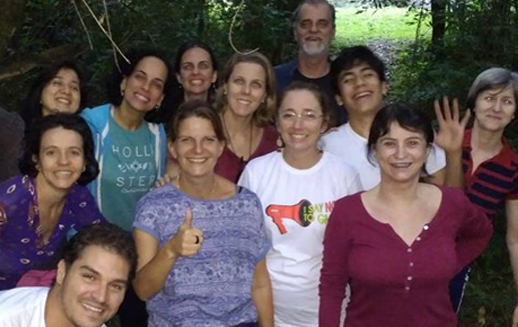
Testimonials from the participants:
“The Course was very good! Rincão Gaia is a very quiet and inspiring place. It was a very good study experience and we also had very rich moments of social and environmental coexistence. I was very motivating to expand my knowledge and to develop experiments in this area! The colleagues of IFOAM and IBEM are to be congratulated !!! “Dr. Vera Lúcia Sardá Ribeiro, Professor of Clinical Parasitology, Faculty of Veterinary Medicine, Federal University of Rio Grande do Sul.
The OLC course is a great space that brings together people and initiatives that develop in different places , besides being a space for reflection and discussion of the opportunities and perspectives of agroecology and organic production in the world. The course is very motivating! “Janete Basso, Agricultural Engineer, Extensionist of the Technical Assistance and Rural Extension Company – EMATER / RS.
“Important course provided by IFOAM in partnership with IBEM. In the first meeting we had intense days of many experiences, exchanging knowledge and reflections on agroecology and organic production. The highlight of the course were the different forms of languages worked to communicate, transmit and receive knowledge. My journey has been towards the creation and strengthening of groups, networks and chains for the development of these themes and this course is contributing to give me more tools and knowledge for the construction of this road. “Luiza Schafer, Zootecnista, specialized in networking , solidarity economy and popular education. Porto Alegre / RS.
“I am honored to be part of this OLC class in Brazil! I am more motivated to use the knowledge and networking of this course to expand my performance in organic agriculture! It is a landmark in my life”Mariane Antunes, Food Engineer, Ministry of Agriculture, Livestock and Food Supply / SP.
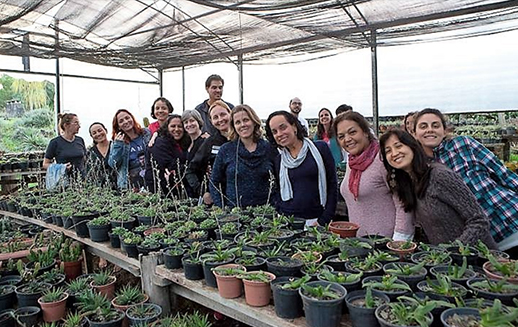
“For me the first module of the Course was fantastic! In addition to the very rich learning and exchange of information and knowledge among participants, it was an excellent opportunity to observe the processes that we developed as a community. I feel like I can evolve more as a human being and be more active in society as a whole in a more harmonious way. “Carolina Ribeiro, producer of seeds, vegetables, fruits and organic eggs in Sítio Cultivar, Nova Friburgo / RJ.
“The course was excellent because it provided me with new knowledge and diverse networking and contact with different forms of leadership and methodologies that can be applied in the process of networking. It was also important to have a more wordly view of organic and agroecological production. The place chosen, Rincāo Gaia is incredible, and promoted an instant connection between the participants, providing us with an enriching experience with pleasant coexistence. The integrative activities were innovative and very important for us to carry out our activities with quality. ” Angela Mocelin, Veterinarian, Extensionist of the Technical Assistance and Rural Extension Company – EMATER / PA.
“The days were full of hard work and in every moment of pause (yoga, meditation, or informal chat) each participant was renewed and integrated into the group establishing more than anything, contacts and networking. Each one gave his best and at the end all gathered to celebrate and thank the opportunity to be there in the great hut in the Gaia Corner. I returned home with my soul washed and renewed hopes. Thank you to IFOAM and IBEM. ” Dr. Magnólia da Silva, Professor of Olericulture and Medicinal Plants, Faculty of Agronomy, Federal University of Rio Grande do Sul.
“Lutzenberger was one of the pioneers in promoting and spreading a true peasant landscape, rescuing the millenarian knowledge of farmers. Today, more than ever, this work must continue. Therefore, it was great to see the theme of agroecology returning to Rincão Gaia through the IFOAM course. “Paulo Backes, ecologist and landscape photographer / RS.
IFOAM OLC AL – BRASIL
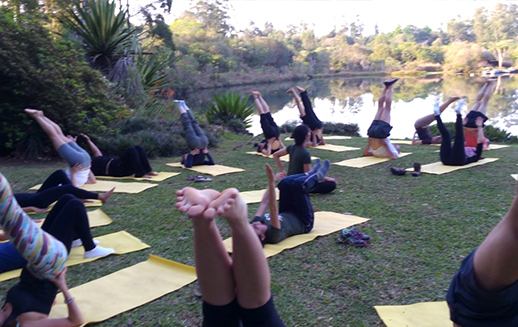
O MUNDO SOB OUTRA PERSPECTIVA



